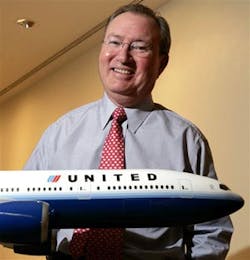United CEO: Airline in Strong Financial Shape
CHICAGO_High fuel prices make it difficult to predict when United Airlines will return to profitability, but the carrier is in strong shape financially after a three-year restructuring, CEO Glenn Tilton said Tuesday on the eve of the company's exit from bankruptcy.
Until the airline industry "sorts itself out," an immediate return to profitability, which the airline predicted last fall would happen this year, should not be the primary gauge of whether United succeeded in Chapter 11 bankruptcy, he said.
"The way we want to be measured is how we perform relative to peers," Tilton told The Associated Press. "I'm confident that the work that we've done will put us in a position to have a competitive result whatever the market environment may be."
Tilton spoke in an interview at the Elk Grove Village, Ill., headquarters of United parent UAL Corp., where he has been president, chairman and chief executive since 2002. He expressed a mixture of satisfaction and "closure" as the nation's No. 2 airline prepared to emerge from bankruptcy Wednesday morning - smaller, less cost-burdened and more internationally focused than when it entered.
During nearly 38 months in Chapter 11 - more than twice as long as expected - United slashed $7 billion in annual expenditures, cut more than 25,000 jobs, eliminated its defined-benefit pensions and lowered its cost structure to try to end five years of unprofitability.
"What we have been through was an enormous stress test," Tilton said. "Pundits again and again were of a mind we wouldn't pass our stress test. And that didn't happen. I think the story is that which doesn't kill you makes you stronger."
The 57-year-old Tilton, who spent three decades in the oil industry before coming to United, publicly acknowledged not long after his arrival in the fall of 2002 that Chapter 7 - going out of business - was a possibility. Asked how close the company came to liquidating, he said, "It was close."
"The real story of this bankruptcy, as much as what happened, is what didn't happen," he said. "No strikes, no litigation, two rounds of consensual agreements, a consensual deal with the PBGC (Pension Benefit Guaranty Corp.) and replacement pensions consensually negotiated with all labor groups."
As the then-chairman and CEO of Texaco Inc., Tilton was at the helm during the company's acquisition by Chevron Corp. in 2001 and has long advocated consolidation in the crowded U.S. airline market. But he dismissed notions that he is aggressively seeking a merger partner for United soon after it leaves bankruptcy.
"It's a very unpredictable landscape," when asked about the possibility of a merger as soon as this year. "I think the best thing for United to do is to continue to get its house in order and prepare itself for whatever opportunity presents itself, and to make a decision at that juncture that would be best for our new shareholders."
The best way to describe his view on mergers, he added, is "attentive rather than in pursuit of anything."
Tilton stands to receive stock ultimately valued at more than $15 million after the company's new stock begins trading Thursday on the Nasdaq Stock Market - part of a plan giving 400 United executives 8 percent of the shares that won court approval despite opposition from unions and other parties in the case.
The CEO defended the plan as standard practice and necessary to attract management talent. "It is in everyone's best interest for management to have a higher portion of their compensation at risk, and tied to the performance of the company's stock," he said. "Importantly, all of our employees will share in stock in the new company."
___
On the Net:
http://www.united.com
